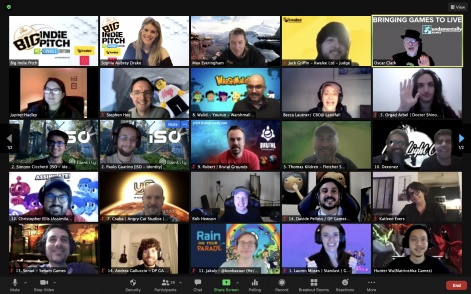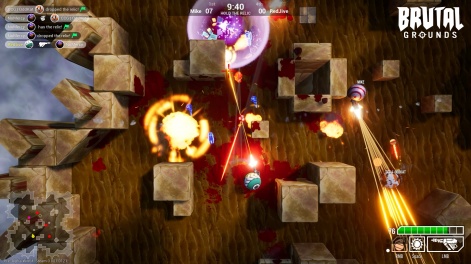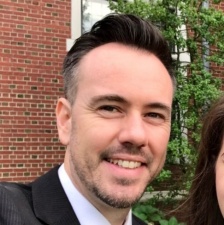The Big Indie Pitch is a regular event run by the makers of Pocket Gamer and PC Games Insider. It sees indie developers engage in a speed-dating-styled pitching competition for fame and those sweet, sweet promotional packages.
The event gives indies five minutes to pitch their games to a panel of press, publishers and industry pundits. The judges then pick three winners and everybody gets valuable feedback.
The indie view
The Big Indie Pitch is getting bigger and bigger as we bring it to events all across the world. To give you an idea of what the event is like, who attends the events and the games on show, we've sat down with a number of past PC Indie Pitch contestants to offer their views.
Today, we're speaking to AGOG Entertainment's Robert Hubert, who submitted Brutal Grounds to The Big Indie Pitch (PC+Console Edition) at Pocket Gamer Connects Digital #5 and walked away as the runner-up.

Sophia Aubrey Drake: Tell us a little about yourself and your indie studio - who is on the team, and what are their inspirations?
Robert Hubert: AGOG Entertainment was launched in 2009 by my Sister, Kat and I based out of our apartment in Los Angeles California. We started the studio as a way to teach ourselves how to develop games. Since then, we have released 7 mobile games and taken part in several other dev projects. Two years ago, teamed up with Brian Howard who is the lead developer on Brutal Grounds, Mike Geaney, and Trevor Malone who are developers as well. Kat does the game art and map dev, I do the UI and SFX as well as manage the business end of things. About a year ago we were joined by Rory Given who is the composer working on the soundtrack and in-game dynamic audio. All of us are big videogame nerds, with a lot of our inspiration coming from the old school shooters we used to play together like Quake, Unreal Tournament, and Doom, so you may see some of that in Brutal Grounds. More recently, we have been impressed with the evolution of eSports and the surrounding industry and I think that has definitely steered some of our focus in developing aspects of this game.
The team is located in three different countries with three of us in the US, two in Canada, and one in the UK. So we take full advantage of tools like Discord, Google Suite, and ClickUp for our communication and project organization. Fun fact: we all have day jobs. So all our dev work is done in our spare time, lots of late nights and weekend hours spent on voice chat hashing out design details and playtesting.
Tell us about Brutal Grounds that you pitched at the competition.
Absolutely. Brutal Grounds is a comically bloody competitive top-down ball-rolling (yes I said Ball-Rolling) arena shooter where players equip a “meat-filled-marble” with various weapons & abilities and take to the arena to battle it out in games of capture the flag, king of the hill, deathmatch, and more.
The game presents a unique take on the shooter genre by adapting elements of the modern FPS and translating them into a top-down arena shooter while also borrowing elements of classic arcade fighting games to create a fresh and engaging play style.
Players use and abuse momentum, take advantage of weapon recoil, abilities, and other unique movement strategies that allow for exciting and visually engaging fights to unfold.
Brutal Grounds centres around teams of four players for team games, and eight players for solo games. New players will find the low skill floor refreshing while competitive players will enjoy a high skill ceiling for those who want to play competitively.
The game has been in development for just about two years and while we think of it as still in alpha, everyone keeps telling us to "just release it already", and to that, I say, "we will when it's ready".
Just recently, however, we did release something quite exciting, volume one of the Brutal Grounds OST which is now available on Spotify and YouTube.
The team could not be more proud of the album. Rory managed to bring out a sound for the game that is better than we could have imagined.
What do you think are the most unique and interesting aspects of Brutal Grounds that gamers may never have seen before.
I think our translation of the FPS fighting experience into a top-down game combined with the dynamic momentum-based movement mechanics you get from the ball makes for a really fun and unique playstyle. While the game is set in a top-down world, it still maintains a great deal of the fighting mechanics you would expect of an FPS and actually adds a bit of nuance to the way players navigate and strategize plays in the arena.
Brutal Grounds is a top-down massively multiplayer arena battler with a focus on eSports. To say this is a key market, one with a fair bit of wider attention would be an understatement. However, this makes it very competitive. So, what made you choose to target this market, and what do you think you bring to it that may not have been seen before?
I don’t think we quite fall in the massively multiplayer arena genre, or at least that's not what we're shooting for - while we do support upwards of 36 player matches, Brutal Grounds is really focused around the dynamics of the 4v4 player game. So, we probably fit better somewhere in between the Rocket Leagues and Overwatches out there. Which we are hugely inspired by. We wanted to position the game somewhere within these team-based types of games where there was a large enough demand for a new kind of competitive experience. First and foremost however we really just wanted to create something all of us wanted to play and then we narrowed that focus a bit to something we felt would be unique enough to garner the attention of players of games in neighbouring genres.
Something interesting that Brutal Grounds brings to the table aside from the obvious “You play as a meat-filled-marble” thing is that there are no heroes or classes, rather we have developed a balanced system where players can mix and match a litany of primary weapons, secondary weapons, and Abilities to create over 200 (and growing) unique load-outs and playstyles. The game focuses more on the capabilities of each player as the ball, rather than a character and their inherent abilities and this makes it feel and play much more like an actual sport.
How did you come to choose the platforms that you would develop Brutal Grounds for?
We targeted PC as our initial launch platform for its accessibility and openness. PC presented the least barriers from concept to release out of all the other traditional platforms. That’s not to say we don’t have our sights set on those platforms as well and we believe the game would be a great fit as a twin-stick-shooter on consoles, but right now, without a publisher, PC is where it’s at.
Looking at the studio a little more now. How hard is it to survive as an Indie developer?
Let’s just say that right now, while we're bootstrapping everything ourselves, if we didn't have our day jobs (that’s correct, all the work on this game has been done in our spare time), there wouldn't be a game.
Under the definition of indie developer, you will find indie teams with AAA industry veterans with millions in funding working full time on a title grouped right alongside teams like ours, with a handful of friends grinding away in their spare time on a project with zero budget and everything in between. That said, we like being grouped with those folks because great games can come from anywhere, and so can bad games. Without prior industry connections and funding, you just have to work harder and forge a path that leads to connections and funding. Over the course of developing Brutal Grounds, we have met countless indie devs just like us, and they are some of the hardest working scrappy groups of people you will ever meet. And that's because, at our level, everything we do comes from a place of passion. We know we're up against giants, so we have to keep grinding and learning and building until we make it. But yeah, right now it’s tough out there. Competition keeps piling up - definitely lots of long nights and weekends.

Are there any tips and advice you would give to independent developers out there who are just starting out?
There are countless reasons to make a game, so there’s no one bit of advice for why or how to develop a game. Just make the game you want to play, but set yourself up for success. Find people who have succeeded and learn everything you can from them. Make a list of the connections you want to make and reach out to new people regularly, never stop connecting. Think about your endgame first. What is it that you want to achieve with your game? Build that into your game from day one. Build your community now, it’s never too early to start engaging with your future players. Make sure what you are developing is built to scale, meaning, don't code yourself into a corner, plan for success, and think about what you might need down the road and you can save yourself a lot of work when you get there. Building a game can be a very long and sometimes bumpy road, keep at it.
How did you find your experience pitching as a part of the Big Indie Pitch?
The Big Indie Pitch was amazing. We didn’t quite know what to expect being our first time at the event and having it all virtual. So, I spent a good amount of time to make sure our pitch could work for anything but the format of the event ended up being perfect for a digital show and was exceptionally well organized and went off without a hitch. It was amazing to get to pitch to so many different judges who all come from different areas of expertise and to get to hear their feedback in real-time as well as their official feedback post pitch. It was fun to hang out and chat with the other indie devs between pitches as well. I thoroughly enjoyed the event.
What do you feel you have gained from the experience, and what do you still hope to gain?
It was inspiring, educational, and productive. On a personal level, I definitely learned a lot about myself and what it's like pitching to a diverse group of judges that I will take with me to every future event. It was a bit of a crash course in how to pitch a game. I’ve always been the type to attend in-person events and thrive on chatting up a crowd and showing off the game in an open forum, so the change in format really made me aware of what I needed to work on for these types of events and how we can improve the way we demo the game. On a professional level, not only did we make several great connections, we ended up with a number of follow-ups from publishers and other groups who were interested in learning more about our game and potentially partnering with us. In the days and weeks following PGC, we probably had over a dozen exciting calls. Not all of them turned into a partnership but they all created lasting contacts with amazing people and groups. We are still in talks with some of the judges from the event and look forward to working with them when Brutal Grounds is ready.
What are your hopes for this game in the future, and do you have any plans for any future projects?
We are currently looking for funding or a publisher for Brutal Grounds. We have a fairly aggressive roadmap we are working towards before the game is at the level we want it to be before we can release it; getting funding or a publisher would allow us to better position ourselves for release and to knock out a number of stretch goals. A large part of Brutal Grounds is geared towards the competitive/eSports nature of the game, and so we are spending a significant amount of time developing out the platform required for both players and spectators to have the best experience possible. Our dream come true for Brutal Grounds would be for it to break into the world of eSports and see some pro-level teams going head to head.
Another area we are putting tons of work into is in making the game totally moddable, from the dedicated server build to the map editor, and the mod system. The goal here is to design the game as a platform that will enable players to continue to build and create new content and game modes long after it’s released. We want it to survive and thrive, and we're backing that up with a lot of hard work creating the tools necessary for the community to take things to the next level.
And finally, if any of the above sounds fun to you and you want to take part in the direction of Brutal Grounds, or maybe just roll around and shoot your friends in the ball, please join our discord and we'll give you free steam keys.
Want to show off your exciting new game? We host Big Indie Pitch events throughout the year, so be sure to keep an eye out on our events page for an event near you, or even our new Digital pitches.
All our upcoming pitches including how to enter can be found over on our upcoming events page on BigIndiePitch.com.
Get the latest news, interviews and in-depth analysis on Twitter, Facebook, and our daily newsletter.















